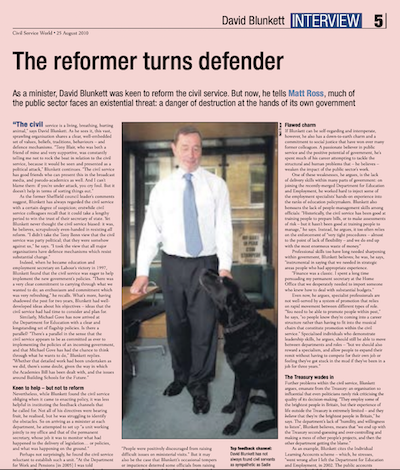 Lord Blunkett
Lord Blunkett
What did they do? First elected as an MP in 1987, David Blunkett served as education secretary, home secretary and finally work and pensions secretary under Tony Blair. CSW interviewed him in summer 2010 as he was re-adjusting to life on the opposition benches.
What did they say? Speaking about the Treasury, Blunkett said: “They employ some of the brightest people in Britain, but their experience of life outside the Treasury is extremely limited – and they believe that they’re the brightest people in Britain.” The department’s lack of “humility, and willingness to listen” meant that “we end up with the Treasury second-guessing and over-controlling and making a mess of other people’s projects, and then the other department getting the blame.”
As an example, Blunkett cited the Individual Learning Accounts scheme – which, he stressed, “went wrong after I left the Department for Education and Employment, in 2002. The Public Accounts Committee hauled the department over the coals, but it should have been the Treasury: they were the ones who completely reshaped the scheme, and created a monolith which was exploitable by fraudsters and lost us £50m. The more we can get the Treasury off day-to-day decision-making and on to the job they’re supposed to do, the better.”
Where are they now? Blunkett stepped down as an MP in 2015 and was awarded a peerage in the same year.
What do they say now? “Things have moved on since 2010. The Treasury have moved at least a substantial number of staff out of London and an impressive diversity programme has been put in place.
“All of this is good news, but the underlying challenge highlighted back in 2010 remains. Namely, groupthink. Those with any training in economics often use completely outdated models, with something in the DNA that is reminiscent of the catastrophic mistake of sticking to the gold standard between the wars.
“A mindset of ‘mild austerity’ bedevils creativity, and old ways of thinking and delivering endure. Things might change in the next five years, but pigs might fly.”